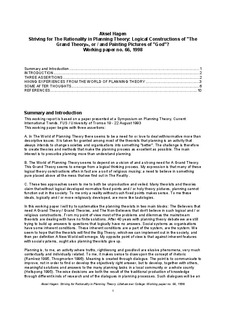| dc.description.abstract | This working report is based on a paper presented at a Symposium on Planning Theory, Current International Trends. FUS / University of Tromsø 19 - 22 August 1993
This working paper begins with three assertions:
A. In The World of Planning Theory there seems to be a need for or love to deal withnormative more than
descriptive issues. It is taken for granted among most of the theorists that planning is an activity that
always intends to change societies and organisations into something "better". The challenge is therefore
to create theories and methods that make the planning process as excellent as possible. The main
interest is to prescribe planning more than understand planning.
B. The World of Planning Theory seems to depend on a vision of and a strong need for A Grand Theory.
This Grand Theory seems to emerge from a logical thinking process. My expression is that many of these
logical theory constructions often in fact are a sort of religious musing; a need to believe in something
pure placed above all the mess that we find out in The Reality .
C. These two approaches seem to me to both be unproductive and veiled. Many theorists and theories
claim that without logical developed normative fixed points and / or holy theory pictures, planning cannot
function out in the society. To me only a reality without such fixed points makes sense. To me these
ideals, logically and / or more religiously developed, are more like tautologies.
In this working paper I will try to systematise the planning theorists in two main blocks: The Believers that
need A Grand Theory / Grand Theories, and The Non-Believers that don't believe in such logical and / or
religious constructions. From my point of view most of the problems and dilemmas the mainstream
theorists are dealing with have no finite solutions. After 40 years with planning theory debate we are still
trying to build up answers to questions that logically have no answers. Social systems as organisations
have some inherent conditions. These inherent conditions are a part of the system, are the system. We
seem to hope that the theorists will find the Big Theory, which we can implement out in the society, and
then per definition A New World will emerge. My opposite point of view is that against inherent features
with social systems, ought also planning theorists give up.
Planning is, to me, an activity where truths, right/wrong and good/evil are elusive phenomena, very much
contextually and individually related. To me, it makes sense to draw upon the concept of rhetoric
(Ramírez 1995, Throgmorton 1996). Meaning is created through dialogue. The point is to communicate to
improve, not in order to find or develop the objectively right answer, but to develop, together with others,
meaningful solutions and answers to the many planning tasks in a local community or a whole county
(Hellspong 1995). The wise decisions are both the result of the traditional production of knowledge
through different kinds of research and of the dialogues in planning processes. Such dialogues will be an
Aksel Hagen: Striving for Rationality in Planning Theory. Lillehammer College: Working paper no. 66, 1998.
2
arena for policy, professional knowledge and common sense. Moreover, this has nothing to do with
relativism, you do not decide such cases by chance. Wisdom teaches us how to use practical experience
and at the same time to evaluate the concrete situation on its own terms. | en |
